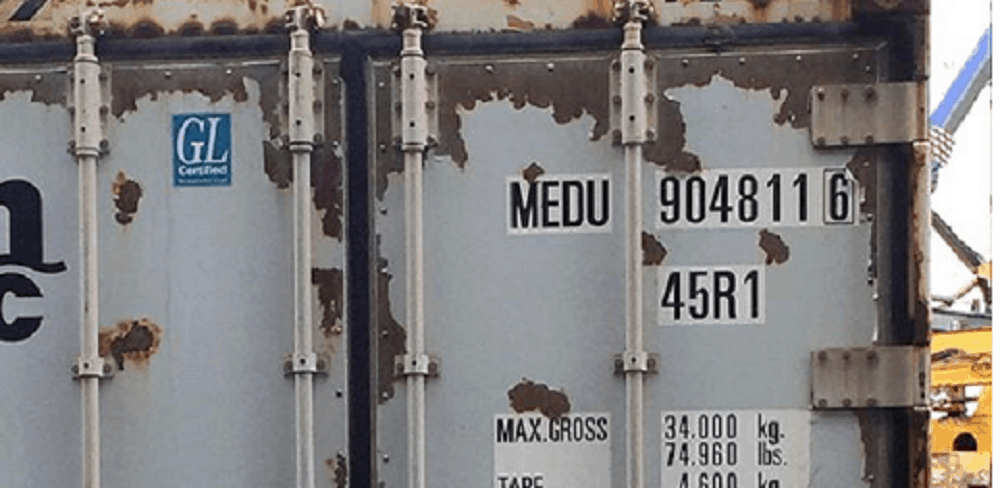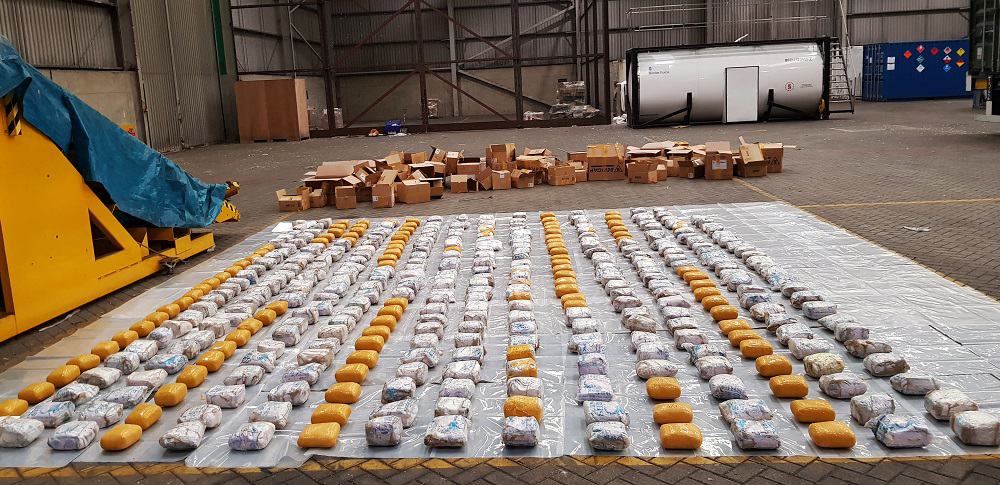Container shipping’s drug problem will just not go away. After a string of police busts in the U.S. this year, the focus has switched to European ports in recent months.
As reported in FreightWaves, a record 1,279 kilograms of heroin with a street value of £130 million ($148 million) was seized at the port of Felixstowe, England, on Aug. 30.
Italian police topped that value earlier this week when 1,176 kilograms of cocaine worth 250 million euros ($275 million) was found in a reefer container (pictured above; source: Europol) with Mediterranean Shipping Company (MSC) branding at the Port of Gioia Tauro, a container shipping hub in southwest Italy.
Europol said the Italian Carabinieri (Carabinieri) and the Italian Finance Corps (Guardia di Finanza), supported by Italian Customs, Europol and Frontex, seized the drugs Nov. 11.
‘Ndrangheta mafia to blame
“This seizure confirms the port of Gioia Tauro as a major hub for the transit of cocaine trafficked to western Europe,” said a statement from Europol.
“This is also shown in other recent Italian investigations against ‘Ndrangheta criminal structures active in the transnational cocaine trafficking.”
Shipping documents indicated the box was destined for Germany.
The seized cocaine was hidden in 144 packages within a case of bananas stored in a refrigerated container. The drugs were detected after the Italian Finance Corps and Customs authorities performed an extensive risk analysis of several vessels and containers arriving at the port of Gioia Tauro. The case was then referred to the Anti-mafia District Prosecution Office.

In the past 12 months alone, the Italian Finance Corps and the Customs Agency have seized over 2.5 tonnes of cocaine at Gioia Tauro.
Europol and Frontex provided technical and operational assistance in the investigation that preceded the seizure. “The early deployment on-the-spot of Europol experts facilitated the immediate exchange of information with other potentially affected EU Member States,” added Europol.
No response about the ownership of the box was forthcoming from MSC at the time this article was published.
Europol could not confirm if the container was MSC-owned when contacted by FreightWaves.
Container shipping’s drug problem
The use of container shipping for drug smuggling has become a global issue during 2019. The Aug. 30 heroin seizure from a Maersk vessel at the port of Felixstowe followed the seizure of 398 kg of heroin from a vessel at the same U.K. gateway Aug. 2.

At the Port of Lazaro Cardenas in Michoacan, Mexico, 23,368 kilos of fentanyl arriving from China were found on the Svendborg Maersk on Aug. 23.
In the U.S., the Port of Philadelphia was the scene of a record cocaine bust in June, the second U.S. drug bust this year involving a container ship operated by MSC.
MSC released a statement that it “has a long-standing history of cooperating with U.S. federal law enforcement agencies to help disrupt illegal narcotics trafficking and works closely with U.S. Customs and Border Protection.
“Unfortunately, shipping and logistics companies are from time to time affected by trafficking problems,” it added.
Globalization fuels smuggling
The rising tide of drug smuggling in large quantities using containers has long been predicted as a likely consequence of globalization.
The Stockholm International Peace Research Institute (SIPRI) issued a policy paper in 2012 predicting the global shipping industry would be used for the transport of narcotics, arms and other illicit cargo. The authors, Hugh Griffiths and Michael Jenks, pointed to a particular risk in future years for the container shipping industry.
“Maritime trade is one of the pillars of globalization. As new economic powers emerge and new trading links are forged, maritime trade will continue to expand,” they wrote. “Understandably, governments will continue to weigh the benefits of stricter controls on the shipping industry against the significant costs of jeopardizing their countries’ involvement in the maritime trade.”
Drugs – just another boxed commodity
According to the SIPRI report, “Maritime trade has always included a share of illicit activity. However, the advent of containerization in particular has given maritime traffickers unprecedented opportunities to integrate their activities into the global supply chain.
“Containerization provides trafficking with the same cost- and time-saving transport mechanisms that have allowed the world’s multinational companies to deliver their products quickly and cheaply, penetrate new markets and expand their global customer base,” the report said.
“It is likely that, at least as long as the trend toward containerization continues in the licit portion of maritime trade, containers will increasingly be used for many sorts of trafficked commodities – and mainstream companies will increasingly become unwitting accomplices of the traffickers.”
More articles by Mike







